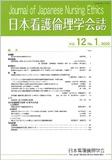Japanese
English
- 販売していません
- Abstract 文献概要
- 参考文献 Reference
本研究では、看護者が患者からセクハラを受けた実態と性役割態度と倫理的行動を明らかにする。方法は質問紙調査法で、内容は平等主義的性役割態度スケール短縮版:SESRA-Sと倫理的行動尺度である。対象は東北6県の看護者834名(女性94.8%、男性4.7%)であった。セクハラ体験の割合は62.6%であった。セクハラを受けた時の感じ方の回答632件中「不快感があった」が6割強であった。セクハラ体験の有無別に、SESRA-S得点および倫理的行動尺度得点に差がなかった。「SESRA-S」と「倫理的行動尺度」はp=0.302と弱い正の相関があった。看護者が患者からセクハラを受ける原因が、看護者個人の性役割態度や倫理的行動にあるとは言えなかった。今後、日本の病院での看護者に対するセクハラ防止対策を立案する際、患者側の要因も考慮する必要があることが示唆された。
The purpose of this study is to examine the actual condition, sex-role attitudes and ethical behavior of nurses who experienced sexual harassment from patients. The study employs a questionnaire survey, and the contents are “The scale of egalitarian sex-role attitudes—a short form (SESRA-S)” and the “Ethical Behavior Scale”. The subjects were 834 nurses (94.8% female, 4.7% male) in six prefectures in the Tohoku region of Japan. 62.6% of the participants had experienced sexual harassment. Of the 632 answers given by respondents who experienced sexual harassment, “There was a sense of discomfort” accounted for over 60%. There were no differences in the SESRA-S score and the Ethical Behavior Scale score depending on whether or not sexual harassment was experienced. There was a weak positive correlation between the SESRA-S score and the Ethical Behavior Scale score, p=0.302. The cause of nurses' sexual harassment from their patients could not be attributed to their individual sex-role attitudes and ethical behavior. In the future, it was suggested that patient factors should be taken into account when planning sexual harassment prevention measures for nurses in Japanese hospitals.
Copyright © 2020, The Japan Nursing Ethics Associatin. All rights reserved.


